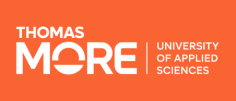Electronics

Connect with the technology of tomorrow!
- Electronics is more than a hobby for you but an all-consuming passion.
- Explore the latest technological innovations and learn how to apply them.
- Discover the full potential of trending technologies, from smart electronics to connected devices and the internet of things.
- Choose between majors in hardware or software development.
- Put theory to practice with project-based work and practical enterprise labs.
- Boost your problem-solving credentials while designing, developing and even producing new electronic devices and embedded hardware.
- Design circuit boards from scratch while unlocking the secrets of web applications, mobile solutions and professional audio and video.
- Immerse yourself in the world of smart electronics while majoring in software.
Important! When applying to this program you have to chose one of the following majors:
- Embedded hardware
- Embedded software
Personal coaching
Have a question about one of your classes? Queries about your project work? Or are you simply keen on trying something new? Never hesitate to reach out to your tutors and lecturers. We prefer personal guidance and our doors are always open! Log in to your “doelandschap” to track the progress of your projects and find lecturers who can provide assistance or feedback.
In practice
Your cross-curricular project work will bring you into close contact with the business world. You’ll progress rapidly from simple electronics projects in phase 1 to more complex projects in an industrial and technological context in phase 2. Culminating in your (international) internship and bachelor's thesis in your final semester.
Your internship is your chance to bring all your skills together and apply them to a real-world customer case. You will also profit from a dedicated university lecturer who will follow up on your internship and bachelor's thesis.
- Wypis ocen – jeśli wciąż się uczysz i dlatego nie masz jeszcze świadectwa ukończenia szkoły średniej, bardzo ważne jest załączenie wypisu. Szczegółowe informacje na temat sposobu wypełniania tego dokumentu znajdziesz tutaj.
- Świadectwo dojrzałości – w przypadku ukończenia szkoły średniej nie potrzebujesz wypisu ocen – wystarczy, że do formularza aplikacyjnego załączysz Świadectwo dojrzałości wraz ze świadectwem ukończenia liceum (bądź technikum).
Spełnienie wymagań w zakresie języka angielskiego można udokumentować w jeden z następujących sposobów:
- IELTS Academic - 6.0
- TOEFL - 79 (kod instytucji: C070)
- Duolingo - 110
- Hardware and PCB Developer
- Analogue Circuit Designer
- Mobile/RF-communication specialist
- Sound and Video Technician
- Firmware Developer
- Embedded Linux Developer
- IoT Software Developer
- Application Programmer
- Electronics Designer
